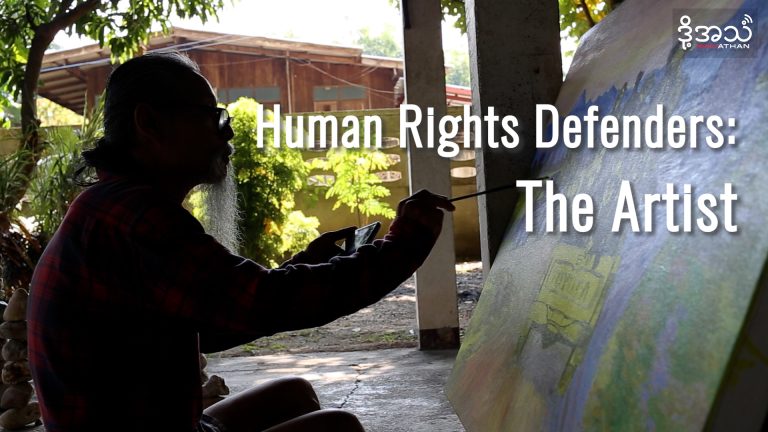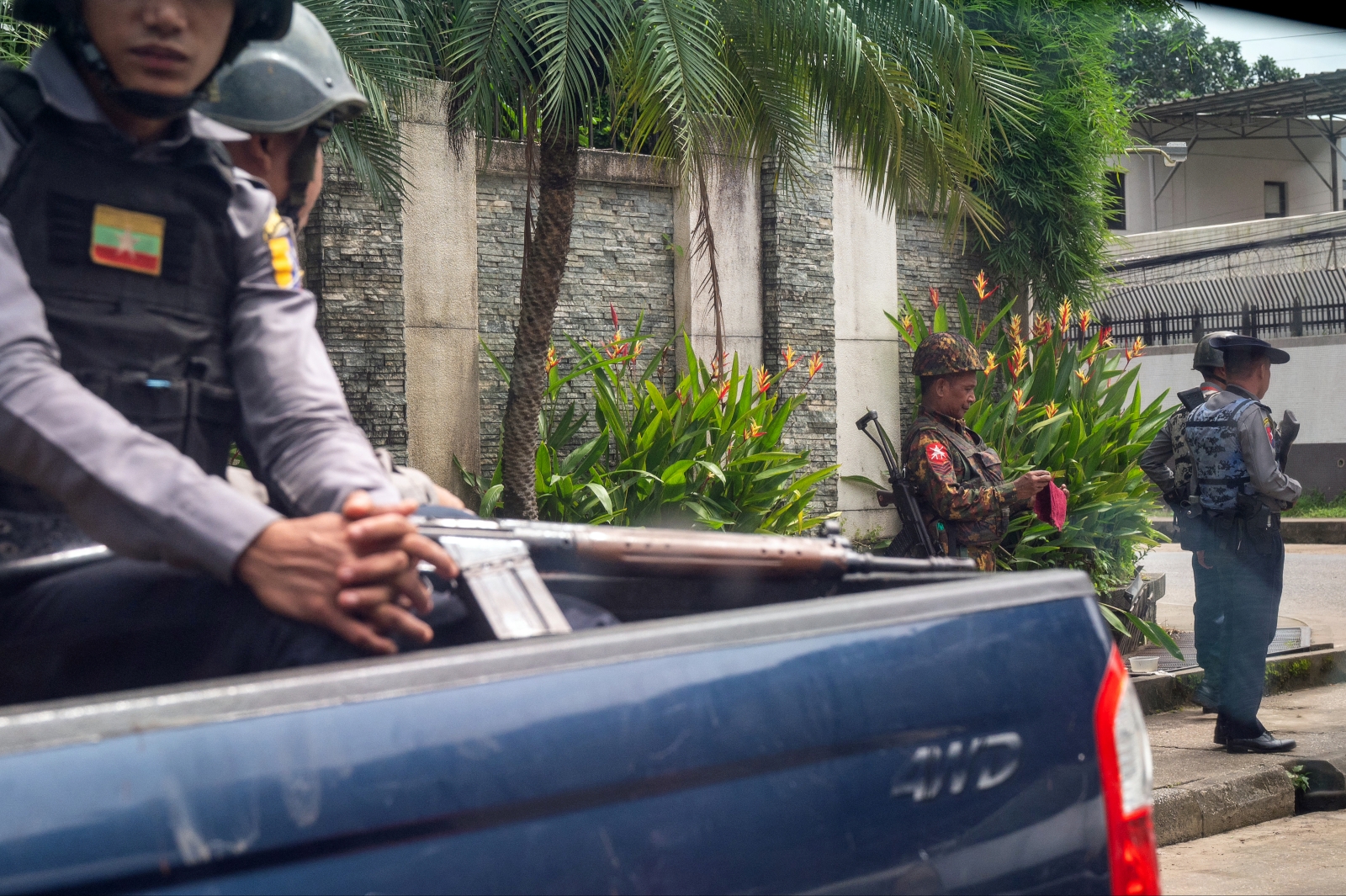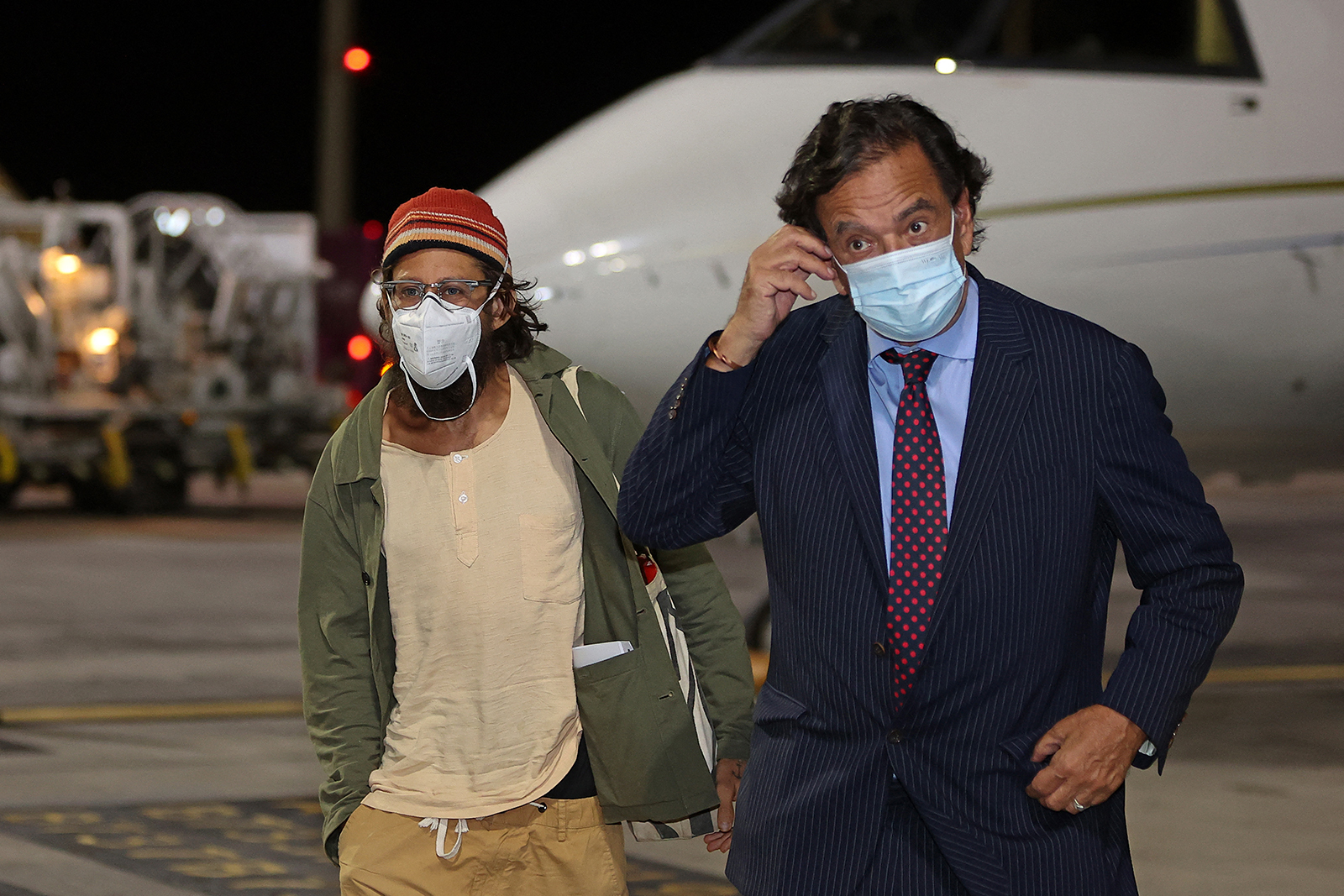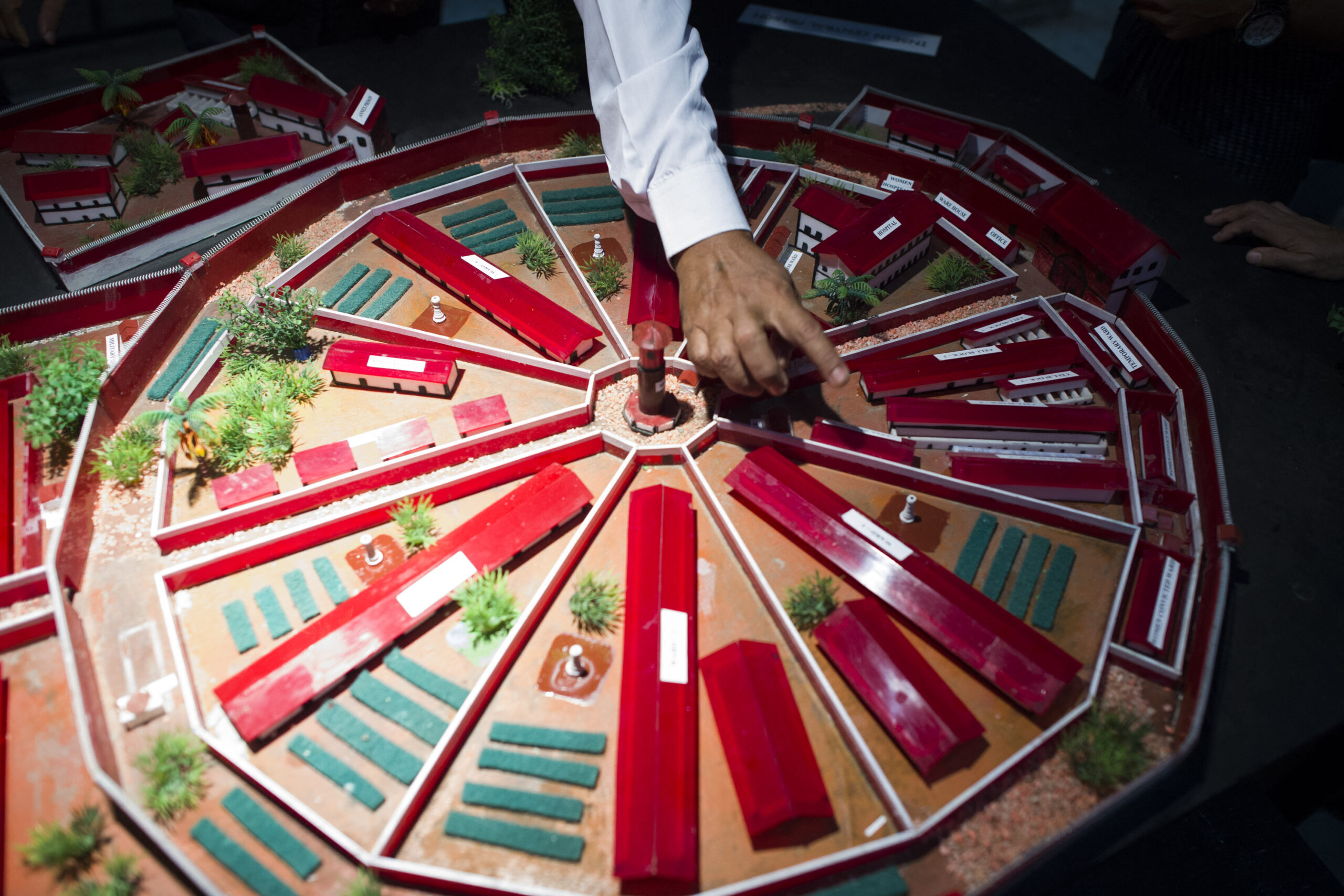The grandson of former dictator Ne Win discusses the 1988 uprising, life in prison, the reform process and deficiencies in democracy.

The grandson of Ne Win makes merit at a local buddhist shrine. Photo by Jeroen de Bakker
In the life of U Aye Ne Win nothing is normal. Born in 1976 into the most powerful family in the country, that of omnipotent ruler Ne Win, the dictator’s grandson sat front row during key events in Myanmar’s history. Later the family name became a burden that landed him a lengthy prison sentence over an alleged coup plot.
From an early age U Aye Ne Win learned that he was not a normal child. His mother, Daw Sandar Win, taught him how to behave responsibly and wave at the passing motorcades of visiting dignitaries.
At school some children had a hard time adjusting to their prominent fellow pupil. “When I was eight years old one of my friends told me my lunchbox was stolen,” U Aye Ne Win said. “When I checked they had returned the box. My food was still in it. It turned out they had wanted to take a look at what I ate. They were disappointed I ate the same food as anybody else.”
U Aye Ne Win, a well-groomed dandy with a slightly chubby posture, sat down for the interview at a cousin’s house. The Ne Win family’s lakeside residence is off limits to journalists and photographers.
Support more independent journalism like this. Sign up to be a Frontier member.
When he was 12, Myanmar, then still called Burma, faced turbulent times. Millions joined protests against the junta that culminated in a national uprising on August 8, 1988. On that historical date protests and strikes paralysed the country. The army reacted with force. About 3,000 demonstrators were killed in a bloody crackdown.
“When the army shoots, it shoots to kill,” Ne Win had warned.
For U Aye Ne Win the protests didn’t signify anything special. He mostly stayed in. “I and my family never felt we were in danger. There were demonstrations, yes, but we didn’t feel threatened at all. We went about our usual routine.”

U Aye Ne Win, the grandson of Ne Win. Photo by Jeroen de Bakker
One of the main catalysts for the uprising was the economic hardship wrought by a failed 25-year experiment with a socialist economy. In 1987 Myanmar had to apply for Least Developed Country status, which allowed the government to borrow money at more favourable terms.
U Aye Ne Win acknowledges that Myanmar was dirt poor, but he feels his grandfather was not to blame. “The main root of our country’s problems is the armed conflict,” he said. “We are a country that saw the longest civil armed conflict in the twentieth century. We have a lot of resources, that is why we survived. Imagine all the money wasted. One and a half years ago, a prominent 88 Generation Peace and Open Society member, Ko Ko Gyi, said about the conflict in Kachin State: Everytime you launch a mortar, thousands of dollars are burned. That was a poignant remark. It isn’t surprising that Myanmar was not really a prosperous nation.”
On September 18, 1988, a new generation of military officers seized power in a coup that brought the slow retreat of the Ne Win family from the corridors of power.
After Ne Win stepped down from the Presidency in 1981 he stopped going to his office. Senior government officials still often visited the dictator to seek what they considered to be essential guidance from the ‘old man’. When Ne Win also relinquished the chairmanship of the Burma Socialist Programme Party in July 1988 these visits stopped.
U Aye Ne Win said the family continued to have significant political influence. This was why the government tried to tarnish his reputation and that of his brothers, he claims. In 1989 a state-run newspaper printed the sensational rumour that U Aye Ne Win and his brothers had murdered the teenage son of a well-known pop singer.

His family might not be wealthy, according to his accounts, but Aye Ne Win prefers to do his grocery shopping at Yangon’s upmarket Market Place supermarket. Photo by Jeroen de Bakker
“Little did they know that this boy went on to become the hip hop star J-Me,” said U Aye Ne Win, laughing. “He never actually died. Every time he performed his stage show was a living mockery of the government propaganda.”
An incident in 1999 created further unease in the government. U Aye Ne Win met Dr Michael Aris, the husband of Daw Aung San Suu Kyi, in the months before the British academic’s death. Daw Aung San Suu Kyi wanted to meet Ne Win, as she felt it was the only way to bring about a solution for the political stalemate. U Aye Ne Win was asked to act as postillon d’amour.
“We needed government approval, as Daw Aung San Suu Kyi was still under house arrest,” said U Aye Ne Win. “The idea scared the government; they found it inappropriate. Our family should stay out of politics and cut ribbons and kiss babies; that was the message Secretary-1 Lieutenant-General Khin Nyunt conveyed.” The meeting never happened.
Three years later relations soured even further, when U Aye Ne Win, his father and two brothers were arrested on charges of plotting to overthrow the government. U Aye Ne Win was not impressed by the alleged evidence produced in the case.
“They showcased 80 walkie-talkie sets, for instance. This was supposedly equipment that we were going to use to stage our coup. Actually, my younger brother was heading a telecommunications company. The Myanmar Police Force couldn’t get hold of walkie-talkies and had asked him to import them. I think [Military] Intelligence and the military police did not coordinate and just grabbed whatever they saw at our offices.”

U Aye Ne Win, the grandson of Ne Win. Photo by Jeroen de Bakker
Nonetheless, the judge handed down hefty sentences: U Aye Ne Win was sentenced to death for high treason. He also received a life prison sentence for mutiny.
“I knew the death sentence was coming,” he said. “Strangely, I was rather excited about the whole legal process. I knew they would never hang us. There was no President at the time, and by law the signature of the President was needed.”
At first U Aye Ne Win and his father and brothers did not want to appeal, as they regarded the case as being so absurd that it didn’t merit a response. Then a message from Senior General Than Shwe made them change their minds.
“We were told that if we appealed and the case would go from divisional court to high court and supreme court, that the Senior General would show clemency and pardon us,” U Aye Ne Win said. “So the case went through the whole process, which took two years. And then the Senior General said: it is near the bottom of my priority list. There was going to be no pardon.”
The broken promise angered U Aye Ne Win. “I felt betrayed. I want to put this on the record now, while Senior General Than Shwe and the two witnesses, former Lieutenant-General Khin Nyunt and General Maung Aye are still with us.”
What eventually turned out to be a stay of 11.5 years in prison, started with a stint in a concrete cell at Insein Jail. After 1.5 years the family members moved up the comfort chain, to two adjoining wooden bungalows. U Aye Ne Win filled his days jogging and praying. Sometimes he lifted weights he had made from empty plastic oil drums filled with concrete. The three sons and their father were kept incommunicado from the rest of the family while they were in prison.
U Aye Ne Win and his brother, U Kyaw Ne Win, were released under amnesty in November 2013. His father and another brother, U Zwe Ne Win, were released the previous year.
They regained their freedom in a society in transition, with an economy that was attracting foreign investment after sanctions were eased in response to the reform process begun in 2011. In 2013 the influx of foreign money slowed down. U Aye Ne Win feels that the slowdown is partly the result of Myanmar being too modest. “‘This is a virgin forest’, we should have said; instead we emphasised what we couldn’t do.”
From an investor’s point of view democracy is nice for public relations, he said, but not necessarily needed for the economy to thrive. “Stability and business security are paramount. It’s a big misunderstanding that changing into a democracy will make Burma prosper. Democracy is a costly system to maintain.”

U Aye Ne Win, the grandson of Ne Win seats with family and friends at a restaurant. Photo by Jeroen de Bakker
The Ne Win family continues to prosper, although U Aye Ne Win denies that he and his brothers are enjoying the fruits of the billions of dollars that Ne Win was rumoured to have stashed away in Swiss banks.
“If we would have stolen or accumulated money, there should be a paper trail, or the documents should have surfaced, for instance at WikiLeaks,” he said. “No country has ever frozen or confiscated assets of the family. That itself is a clear indication. I help the family business, mainly with contracts, MOUs and IPOs. I don’t take any actual decisions. When the family makes a profit we all share.”
In June 2015 the brothers said they were taking a majority share in Asia Green Development Bank, which was owned by controversial businessman, U Tay Za. Media reports quoted U Aye Ne Win as saying that the China National Corporation for Overseas Economic Corporation was using the family company, Omni, to invest US$4.9 billion in the Myanmar economy. Later, AGD Bank executives said that only 15 percent of the shares changed hands.
U Aye Ne Win is hesitant to talk about the transaction. “I’m not a liberty to discuss. It is proper for the bank to make its own announcement on that,” he said.
Despite the lost years in prison, he is not vindictive. “I think forgiveness is a good thing,” U Aye Ne Win said. “I feel the government should announce a general amnesty. The stakeholders who can bring about change should feel confident enough to talk freely and work together, without having to lock their doors at night.”
Although historians – and many Myanmar – have been critical of Ne Win’s repressive legacy after he seized power power in 1962, U Aye Ne Win refuses to condemn his grandfather. He is even unsure if dictatorship is any worse than democracy.
“Even democracy can’t guarantee that you won’t get a ruler like Adolf Hitler; he was democratically chosen, a majority of the people in Nazi Germany supported him,” he said.
“His popularity never went down enough to have him voted out, if elections would have taken place. So, for me, it is hard to say if I prefer democracy or authoritarian rule.”






